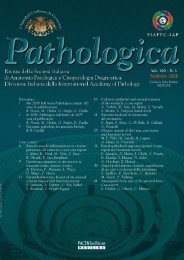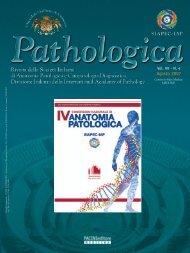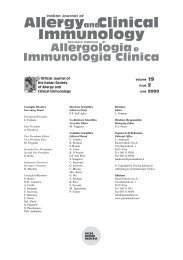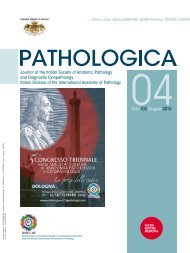Sabato 27 ottobre 2012 - Pacini Editore
Sabato 27 ottobre 2012 - Pacini Editore
Sabato 27 ottobre 2012 - Pacini Editore
You also want an ePaper? Increase the reach of your titles
YUMPU automatically turns print PDFs into web optimized ePapers that Google loves.
RElaziONi<br />
gery, followed by radiotherapy. In the last thirty years the<br />
role of adjuvant therapy with chemotherapy has been long<br />
investigated and discussed. Some cooperative clinical trials<br />
studied the addition of various chemotherapy regimens to<br />
radiotherapy but no randomized phase III clinical trials demonstrated<br />
a benefit from the employment of adjuvant chemotherapy<br />
based on nitrosourea. Furthermore, a meta-analysis<br />
comprising 12 randomized studies suggested a little survival<br />
benefit in those patients who were treated with chemotherapy.<br />
Temozolomide, an oral alkylating agent of recent introduction,<br />
has demonstrated antineoplastic activity as single<br />
agent in the treatment of relapsing glioma. Temozolomide<br />
fulfills its tumoricidal activity by altering DNA and by determining<br />
consequently genetic damages that are incompatible<br />
with cell life. Recent studies demonstrated a key role<br />
of the enzyme O-6-methylguanine-DNA-methyltransferase<br />
(MGMT) in the resistance mechanism to alkylating drugs. In<br />
fact this enzyme removes the genetic alteration produced by<br />
alkylating agents and protects therefore the neoplastic cell<br />
from the lethal damages induced by these drugs. According<br />
to the knowledge of MGMT-induced repair mechanisms and<br />
with the intent to overcome the resistance to temozolomide<br />
in GBM, some studies have developed new temozolomide<br />
administration methods able to work on MGMT. In fact,<br />
the administration of 75 mg/m 2 temozolomide for six weeks<br />
demonstrated a reduction of MGMT enzyme activity. The<br />
reduction of this enzyme activity is important because low<br />
levels of MGMT in tumor tissue are associated with longer<br />
survival in patients with glioblastoma treated with adjuvant<br />
chemotherapy. Furthermore, if associated with radiotherapy,<br />
it can improve its efficacy. On the basis of these assumptions<br />
the EORTC (European Organization for Research and Treatment<br />
of Cancer) and the NCIC (National Cancer Institute of<br />
Canada) have planned and developed a broad randomized<br />
phase III study that includes 573 patients, treated in 85<br />
European and Canadian centers. This study has compared<br />
efficacy and tolerability of radiotherapy alone compared to<br />
the treatment with temozolomide, concomitant and adjuvant<br />
to radiotherapy.<br />
Methods. Patients with a new histological diagnosis of glioblastoma<br />
have been randomized to receive only radiotherapy<br />
(focal irradiation divided in daily fraction of 2 Gy administered<br />
five days a week for six weeks, for a total administration<br />
of 60 Gy) or radiotherapy with a daily continuous treatment<br />
with temozolomide (75 mg/m 2 /die, seven days a week, from<br />
the first to the last day of radiotherapy), followed by six cycles<br />
of adjuvant treatment with temozolomide (from 150 to 200<br />
mg/ m 2 /die, for five days every 28 days). The main objective<br />
has been the survival assessment.<br />
Results. 573 patients, coming from 85 European and Canadian<br />
centers, have been randomized. The average age was 56<br />
years old and 84 % of patients underwent debulking surgery.<br />
To a median follow-up of 28 months, median survival was<br />
of 14.6 months in patients treated with radiotherapy and te-<br />
251<br />
mozolomide, and of 12.1 months in those patients who were<br />
treated only with radiotherapy. Hazard ratio for death risk in<br />
the radiotherapy-temozolomide set had been of 0.63 (95%<br />
confidence interval, 0.52 - 0.75; p







